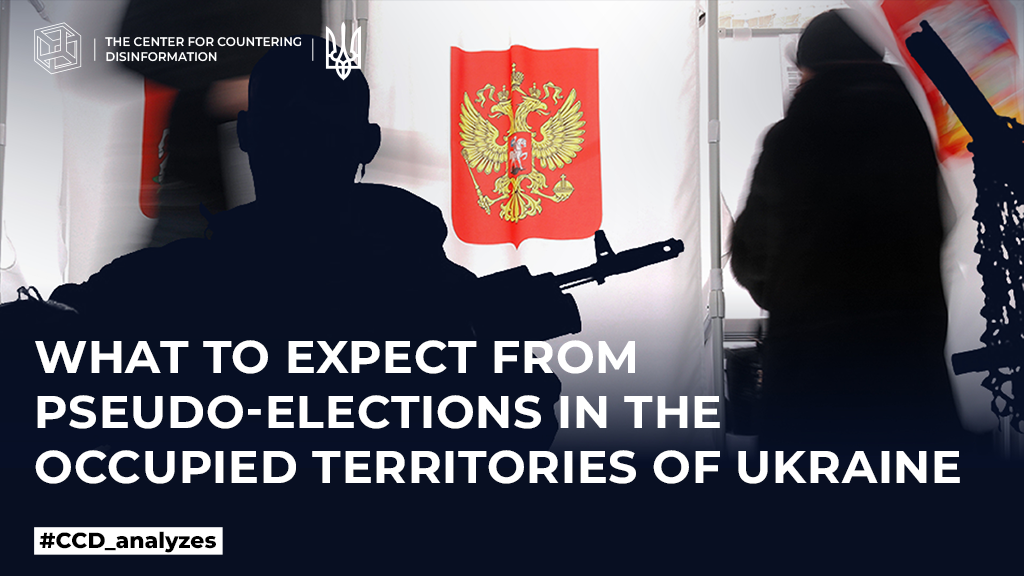The central election commission of russia has decided to hold simultaneous elections for heads and deputies of legislative bodies of state authorities of the russian federation and local “elections” in the temporarily occupied parts of Kherson, Luhansk, Donetsk and Zaporizhzhia regions within the framework of the so-called single election day.
Why does the kremlin need another political farce in the Ukrainian territories?
Organizing demonstrative pseudo-elections in the temporarily occupied territories of Ukraine is a well-established tactic of the russian authorities, similar to the pseudo-referendums in the fake “DPR/LPR”. Therefore, it is an attempt to legitimize the occupied territories in the eyes of russians and the international community and to prove to the russian and Ukrainian populations that russia has annexed them permanently.
It is not without reason that election campaigns in the occupied territories will be held simultaneously with the all-russian elections, which, according to the kremlin, makes them part of the internal political processes, and the election of “people’s councils” should legitimize the occupation authorities in domestic political life.
An important goal of the “elections” is to replace the local “elite” with the russian one and to integrate the occupation administrations into the russian legal and political field. In addition, “elections” in the occupied territories are a proven pretext for the accelerated distribution of russian passports and russification.
What do the organizers of the pseudo-elections fear?
First, the kremlin rightly fears that the results of the “elections” will suffer the same fate as the results of the votes on the creation and “accession” of pseudo-republics to the russian federation, which were not recognized by any civilized country in the world. Of course, attempts to hold elections in the occupied territories are a violation not only of Ukrainian law, but also of the principles of international law, in particular the UN Charter. Therefore, any attempts to hold elections in the occupied part of Ukraine are illegitimate, and their results will have no legal force and cannot be recognized by the international community. In addition, the fake “elections” in no way saved the kremlin from losing Kherson and a number of other settlements liberated by the Ukrainian Armed Forces after their so-called accession to the russian federation.
Secondly, the kremlin’s main problem with the fake vote is to demonstrate a high turnout, which, according to the kremlin’s calculations, should help legitimize the “accession” of these territories to russia. Residents of the occupied territories perceive russians as occupiers and equate participation in the “elections” with treason. Moreover, the Verkhovna Rada of Ukraine called on the residents of the temporarily occupied territories to avoid participating in illegal elections, and the Main Intelligence Directorate of the Ministry of Defense of Ukraine warned of the responsibility of all those involved in the illegal holding of elections. Resistance from the population is being met by the demand to obtain russian citizenship, which for men would mean military duty to russia.
It was not so easy to find candidates for “deputies” and “governors” among the local population, as the fate of traitors in Ukraine is well known. Most of the “candidates” are either collaborators who have long been prosecuted by Ukrainian law or people who came from Crimea and russian regions.
Of course, the russians are aware of such sentiments among local residents, so in order to ensure at least the appearance of a turnout, the occupiers are conducting “explanatory work” with local residents and assuring them that they will allow them to vote without a russian passport. The occupiers are stretching the process of “voting” for almost two weeks – from August 31, it is allowed to “vote” early, and on September 8-9, the russians plan to visit the homes of pensioners so that they “vote” properly at their place of residence.
Third, the Ukrainian counteroffensive has turned the occupied territories into a war zone, which, even from the point of view of russian law, makes it impossible to hold elections there. Of course, with all branches of power concentrated in the russian federation in one hand, this problem can be easily resolved. The russian president’s office for internal policy has already begun consultations with lawyers to resolve this problem, but ensuring the physical presence of occupied Ukrainians at polling stations remains a threat. It is possible that russians from different regions of the russian federation will be brought to the occupied territories to imitate and stage the “election” process.
Therefore, the establishment of any governmental bodies of the aggressor state in the temporarily occupied Ukrainian territories, including through fake elections, is legally null and void. Forced passportization of citizens and forcing citizens to participate in them is not only a gross violation of Ukrainian law, but also of the fundamental norms and principles of international law. However, the invaders are likely to continue preparing to imitate this process using such falsification mechanisms as extraterritorial polling stations (to ensure voting outside the place of residence), advance voting, and repression of those who refuse to be included in the electoral lists.










